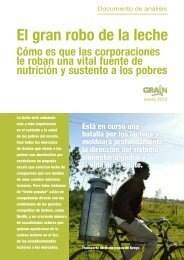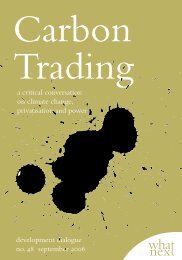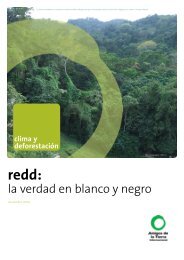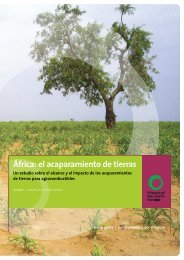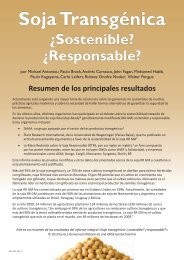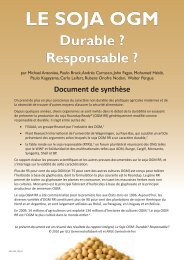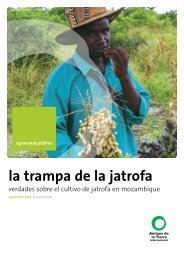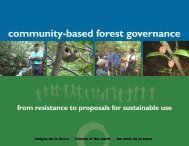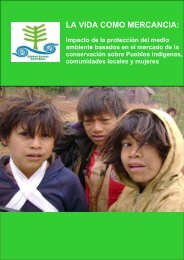Plantations, poverty and power - Critical Information Collective
Plantations, poverty and power - Critical Information Collective
Plantations, poverty and power - Critical Information Collective
You also want an ePaper? Increase the reach of your titles
YUMPU automatically turns print PDFs into web optimized ePapers that Google loves.
127<br />
Criterion 1.6, for example, states that “Forest managers shall demonstrate a long-term commitment to<br />
adhere to the FSC Principles <strong>and</strong> Criteria.” In practice, companies can get away with a public statement<br />
stating that they adhere to FSC’s Principles <strong>and</strong> Criteria, regardless of the reality. Pulp <strong>and</strong> paper<br />
companies that produce raw material in large scale monocultures cannot demonstrate commitment to all<br />
of FSC Principles <strong>and</strong> Criteria.<br />
Principle 2 relates to “Tenure <strong>and</strong> use rights <strong>and</strong> responsibilities” <strong>and</strong> states that “Long-term tenure <strong>and</strong><br />
use rights to the l<strong>and</strong> <strong>and</strong> forest resources shall be clearly defined, documented <strong>and</strong> legally established.”<br />
One of the problems with the certification of industrial tree plantations is that disputes over tenure <strong>and</strong><br />
use rights take place when the plantations are established. By the time the plantation is assessed for<br />
certification, the people who lost their l<strong>and</strong> <strong>and</strong> livelihoods have often long since moved away from the<br />
plantation area. To uncover their stories would involve in-depth research in the slum areas of nearby<br />
towns – research which is beyond the capacity of certifying bodies.<br />
Criterion 5.4 states that “Forest management should strive to strengthen <strong>and</strong> diversify the local economy,<br />
avoiding dependence on a single forest product.” Monoculture tree plantations which produce only raw<br />
material for the pulp <strong>and</strong> paper industry clearly do not strengthen or diversify the local economy. In fact,<br />
they do the reverse. They make the local economy heavily dependent on a single company which is in<br />
turn dependent on one single product: wood as raw material for pulp production. 636<br />
It is difficult to imagine how any industrial tree plantation could comply with Principle 6. It states:<br />
“Forest management shall conserve biological diversity <strong>and</strong> its associated values, water resources, soils,<br />
<strong>and</strong> unique <strong>and</strong> fragile ecosystems <strong>and</strong> l<strong>and</strong>scapes, <strong>and</strong>, by so doing, maintain the ecological functions<br />
<strong>and</strong> the integrity of the forest.” Industrial tree plantations destroy biodiversity, impact water resources <strong>and</strong><br />
soils, <strong>and</strong> are monocultures which replace native ecosystems. Plantation management is an artificial<br />
system which has little or nothing to do with the ecological functions <strong>and</strong> integrity of the forest.<br />
Criterion 6.3 alone should exclude the certification of all monoculture tree plantations: “Ecological<br />
functions <strong>and</strong> values shall be maintained intact, enhanced, or restored, including: a) Forest regeneration<br />
<strong>and</strong> succession; b) Genetic, species, <strong>and</strong> ecosystem diversity; c) Natural cycles that affect the productivity<br />
of the forest ecosystem.” Industrial tree plantations replace ecological functions with a monoculture,<br />
which is harvested in clearcuts <strong>and</strong> replanted. No forest regeneration or succession takes place in an<br />
industrial tree plantation. Diversity is deliberately limited. Natural cycles have little or nothing to do with<br />
the productivity of industrial tree plantations. 637<br />
Criterion 6.6 deals with the use of chemicals: “Management systems shall promote the development <strong>and</strong><br />
adoption of environmentally friendly non-chemical methods of pest management <strong>and</strong> strive to avoid the<br />
use of chemical pesticides.” Industrial tree plantations are at severe risk from pest <strong>and</strong> disease. While<br />
management may “strive to avoid” (whatever that means in the context of tens of thous<strong>and</strong>s of hectares of<br />
monoculture) using chemical pesticides, the reality is that plantation managers are dependent on<br />
636 This point was raised with FSC in 2002, by IMO, one of FSC’s certifying bodies. Six years later it remains true.<br />
Wolfram Kotzurek, Karl Büchel <strong>and</strong> Thomas Papp-Váry (2002) “Requirements for certified plantations. Interpretation of<br />
FSC – P&C”, Institut für Marktölogy forestry division.<br />
637 This point was raised with FSC in 2002, by IMO, one of FSC’s certifying bodies. Six years later it remains true.<br />
Wolfram Kotzurek, Karl Büchel <strong>and</strong> Thomas Papp-Váry (2002) “Requirements for certified plantations. Interpretation of<br />
FSC – P&C”, Institut für Marktölogy forestry division.



